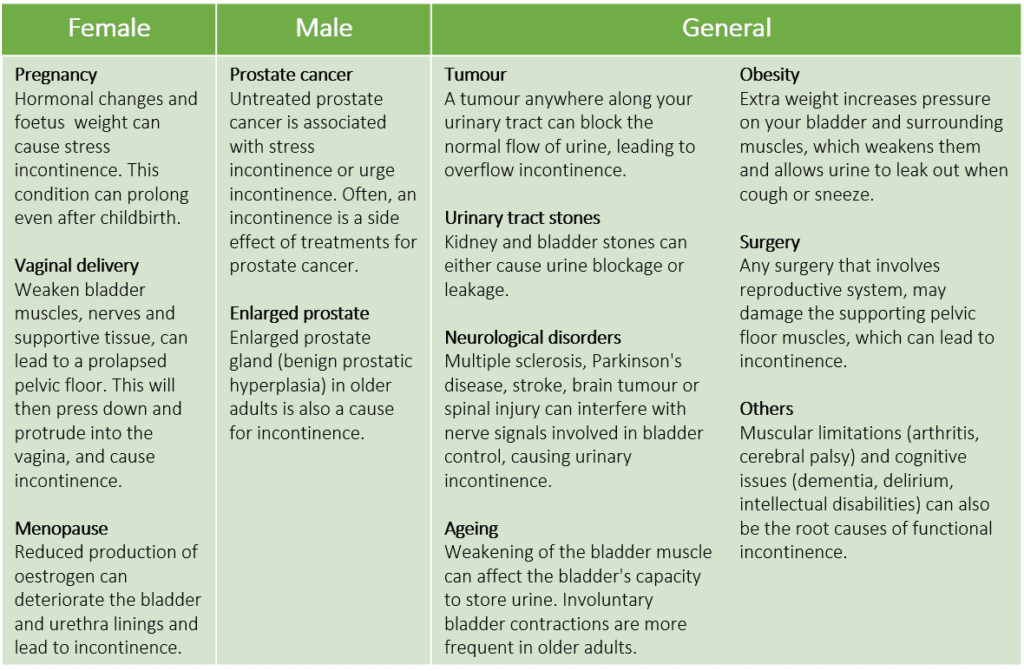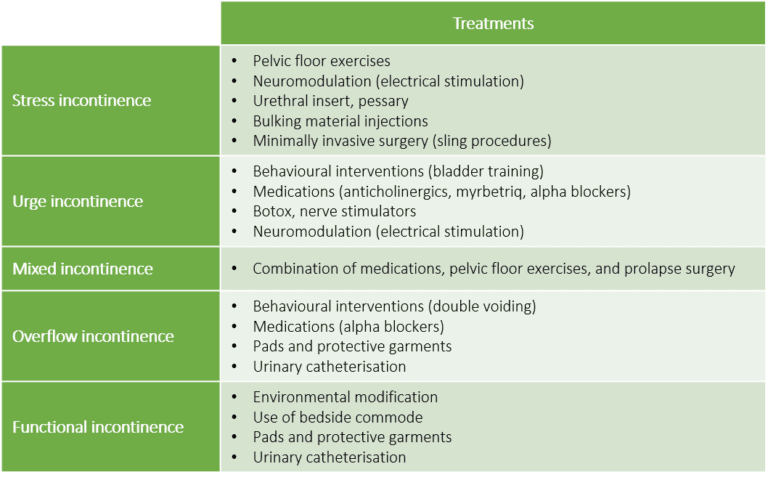Page Contents
Urinary incontinence (UI) is the loss of bladder control causing an involuntary leakage of urine. This is a common condition especially in the older adults. It does not only cause inconvenience and affect self-confidence, but also greatly affect your quality of life.
The severity can be as light as occasional leakage of urine during cough, sneeze, laugh, exercise and heavy lifting, to a more serious condition where you have a sudden urge to urinate that you cannot control and do not get to rush to the toilet in time.

Types of urinary incontinence
There are 3 main types of UI.
- Stress incontinence. The stress here refers to the physical intra-abdominal pressure exert to your bladder instead of mental stress. When you exert pressure onto your bladder either by coughing, sneezing, laughing, exercising or heavy lifting, your weakened bladder muscles not able to withhold the urine and hence causing leakage.
- Urge incontinence or overactive bladder. This is caused by involuntarily contraction of bladder muscles. The causes can be due to infection or neurologic disorder or diabetes. In this case, you can feel the intense urge but unable to control the leakage.
- Mixed or combination incontinence. This type is a combination of stress and urge-induced incontinences as mentioned above.
Other types of UI include:
- Overflow incontinence. It usually happens when you are unable to completely empty your bladder causing frequent or constant dribbling of urine after urination.
- Functional incontinence. This is also known as disability associated-incontinence that deterring you from accessing the toilet in time. For example, physical barriers or problems with walking (arthritis, cerebral palsy) and cognitive impairment (dementia and intellectual disability).
What causes urinary incontinence?
UI can be categorised into 2 groups, the short-term and chronic.
- Short-term urinary incontinence
Certain foods and beverages are diuretics, they help to remove water and salt from your body through promoting urination (Figure 1).

Short-term UI can be caused by some medical conditions, for example:
- Urinary tract infection. Infections at urinary tract can irritate your bladder, leading to strong urges to urinate, and sometimes incontinence.
- Constipation. Hard and compacted stool in your rectum can exert pressure to your bladder or cause the surrounding nerves to be overactive and increase the frequency to urinate.
- Other conditions. Some medications for heart diseases and hypertension, sedatives and muscle relaxants can indirectly cause incontinence.
The foods and beverages in Figure 1 do not cause incontinence by itself, they only increase the frequency of urination. However, you could experience incontinence when you have the above conditions while consuming the foods or beverages with diuretic properties.
2. Chronic urinary incontinence
UI can also be a chronic condition caused by various underlying physical changes (Figure 2):

Diagnosis and treatments
When seeking medical consultation, your doctor will go through a short questionnaire on your family history and perform some physical examinations, such as getting you to sneeze, cough or laugh to verify if it is stress incontinence. Your doctor will also send your urine sample to check for signs of infection, traces of blood or other abnormalities.
Other tests may include a maximum 3-day bladder diary to record your fluid intake, when you urinate, the volume of urine, degree of urgency, the episodes of incontinence, pad use, etc. Postvoid residual measurement is another method which doctor uses a catheter or ultrasound to detect the leftover urine in your bladder after you pass urine.
Depending on the diagnosis outcome of which type of incontinence you are having, its severity and the underlying causes, your doctor will prescribe treatments or lifestyle modifications as shown in Figure 3:

Prevention for urinary incontinence
For some incontinences that are age-related (menopause, enlarged prostate) or caused by medical conditions (tumour, cancer, urinary stones, neurological disorder, etc.), there is very little you can do to prevent it. However, some lifestyle and diet modifications can help decrease your overall risk:
- Maintain a healthy BMI.
- Exercise to strengthen pelvic floor muscles.
- Eat more vegetables to increase your fibre intake and prevent constipation.
- Reduce consumption of foods and drinks that cause bladder irritants, such as caffeine, alcohol and acidic foods.
- Quit smoking and live a healthy life.
Conclusion
Unattended UI can lead to many consequences. Many of these problems are commonly found in elderly with low standard of living and underrated nursing homes, such as:- Rashes, skin infections and sores on constantly wet skin.
- Urinary tract infections that are caused by bacterial growth on urinary tract.
- UI can also affect your self-confidence, personal and social relationships.
